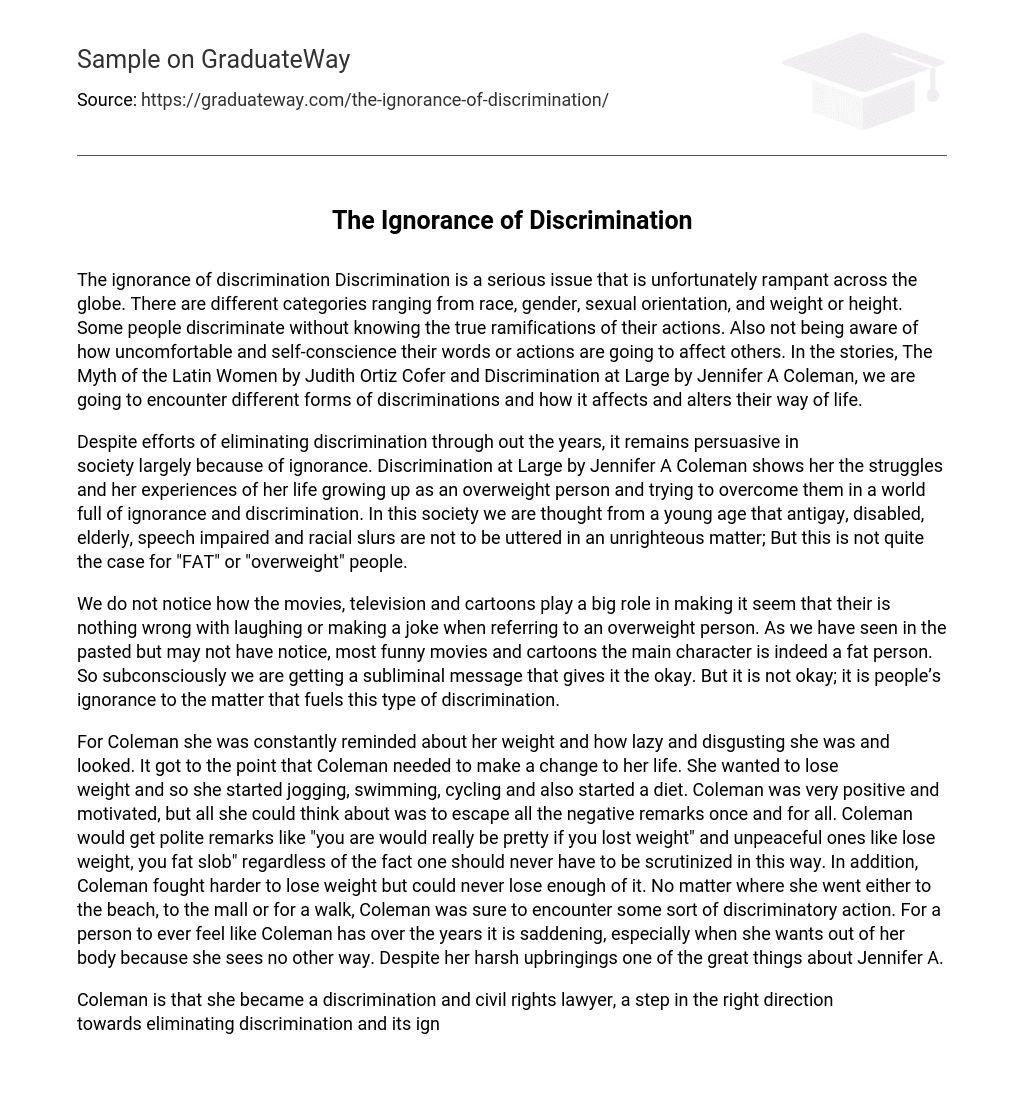The issue of discrimination is a global concern that covers multiple categories, including race, gender, sexual orientation, and weight or height. Many individuals partake in discriminatory behaviors without comprehending the consequences on others or how their words and actions can cause discomfort and self-consciousness. In “The Myth of the Latin Women” by Judith Ortiz Cofer and “Discrimination at Large” by Jennifer A Coleman, we observe various forms of discrimination and see how they impact and transform people’s lives.
In spite of continuous attempts to eradicate discrimination, it remains pervasive in society due to widespread ignorance. “Discrimination at Large,” a book by Jennifer A Coleman, brings attention to her personal challenges during her upbringing as an overweight person and her efforts to conquer the discrimination and lack of awareness she encountered. While we are taught from a young age that using offensive language towards individuals based on their sexual orientation, disabilities, age, speech impairment, or race is unacceptable, this societal norm does not extend to those who are categorized as “FAT” or “overweight.”
Movies, TV shows, and cartoons frequently employ humor to depict overweight individuals, implying that it is acceptable to mock their weight. This connection between obesity and comedy can unknowingly foster our acceptance of this bias. Through placing emphasis on overweight characters in comedic films and cartoons, society subtly normalizes such behavior. Nonetheless, it is crucial to acknowledge the unacceptability of this; it is the lack of awareness among people that perpetuates this form of discrimination.
Coleman was often subjected to negative comments about her weight and appearance, which made her feel lazy and repulsive. This prompted her to make a change in her life by engaging in activities like jogging, swimming, cycling, and following a diet to lose weight. Despite staying positive and motivated, she couldn’t escape the continuous criticism that consumed her thoughts. While some people would occasionally offer polite remarks such as “you’d be quite attractive if you lost weight,” she also had to endure hurtful comments like “shed those pounds, you overweight slob.” It was unfair for anyone to face such relentless scrutiny.
In addition, Coleman made an effort to lose weight but was unable to shed enough. Regardless of her location – whether at the beach, mall, or on a walk – Coleman consistently faced discriminatory actions. It is truly sorrowful to see someone like Coleman experience such feelings over the years, to the point where she desires to escape her own body as she sees no alternative. Despite her challenging upbringing, one admirable aspect of Jennifer A. Coleman is her choice to become a lawyer specializing in discrimination and civil rights, a positive stride towards eradicating discrimination and its associated ignorance.
In Judith Ortiz Cofer’s essay “The Myth of the Latin Women,” she explores the experiences of a Puerto Rican woman living in the United States and the stereotypes she faces due to her Hispanic appearance. Ortiz Cofer describes how she constantly felt judged, as in Puerto Rico, vibrant colors and an abundance of jewelry and accessories are the norm and being fashionable is important for any occasion. However, when attending American parties, she often felt excessively dressed up, resulting in feelings of embarrassment.
In some instances, people would criticize her for wearing excessive jewelry and accessories, commenting that she wears everything all at once. Ortiz Cofer recognizes that certain types of clothing can be interpreted as sexual signals, but she believes that this does not justify making discriminatory remarks based on stereotypes. She recounts an experience of her first dance with a boy who expected her to respond a certain way when he tried to kiss her. When she did not react as he anticipated, he made the comment, “I thought you Latin girls were supposed to mature early.”
Ortiz Cofer is tired of the misinterpretation of stereotypes, as evidenced by these examples. She considers herself fortunate to have received an education, unlike many Latinas who lack that privilege. It is her desire for her work to convey universal truths and challenge all types of discrimination. Ortiz Cofer aims to substitute outdated stereotypes with a more captivating depiction of realities.
With an increasing number of individuals, both men and women, attaining higher levels of education, it is expected that stereotypes and discrimination should decrease. According to a publication from the LaGuardia library titled “How Congress could reduce Job Discrimination by Promoting Anonymous Hiring” by David Hausman in the Stanford Law Review on May 1, 2012, the case of Wal-Mart stores, inc VS Dukes represents progress towards enhancing the conventional hiring process by transitioning it to an anonymous format. By doing so, discrimination by employers would be eliminated.
Eliminating information on the resume about race and sex and getting rid of interviews may encourage some firms to adopt anonymous hiring voluntarily. This approach, supported by studies conducted by psychologists, has the potential to attract productive employees even if the legislation fails to pass.
Despite the absence of evidence demonstrating individual intent to discriminate, the failure to pass at the end does not negate the presence of discrimination in this field. Concrete proof has yet to be established. During an interview, an employer has the opportunity to evaluate an individual. If the employer observes something unfavorable about the candidate’s physical appearance, they may simply assert that the candidate did not meet the required criteria or opt to hire someone else. This allows them to avoid any repercussions associated with discriminatory actions.
Hopefully, by taking these steps to make a difference, we can inspire others to educate themselves and ultimately reduce or eradicate the ignorance of discrimination. Ultimately, both Judith Ortiz Cofer’s “The Myth of the Latin Women” and Jennifer A Coleman’s “Discrimination at Large” share their experiences of discrimination during their upbringing and aim to make a change by sharing their stories. Their goal is to teach others and help them see things from their perspective.





